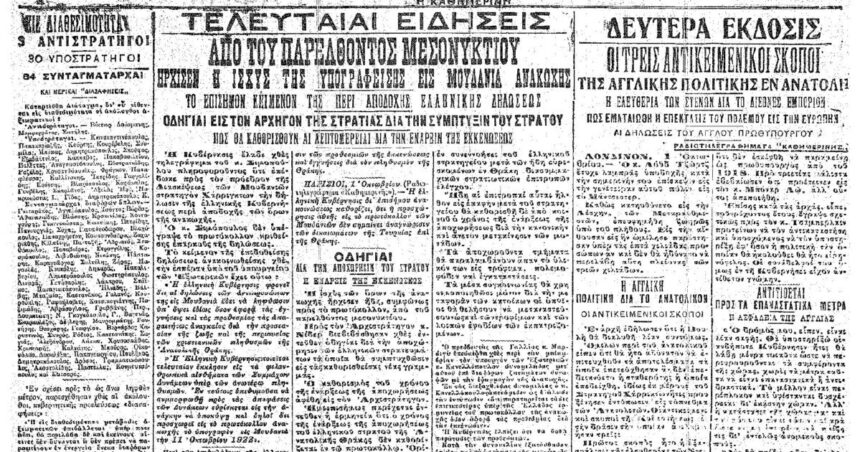After the collapse of the front and the occupation by Kemal’s troops of the Greek-administered areas of Asia Minor, the major European powers convened a Military Armistice Conference on September 20/October 3, 1922 at Moudania on the Asian shores of the Sea of Marmara . The Conference was attended by the United Kingdom, France, Italy and Kemalist Turkey, while Greece was invited later, when the main decisions regarding the withdrawal of Greek troops from Eastern Thrace had already been taken.
The main objective of the three European powers was to maintain freedom of navigation in the Straits. Therefore, they tried to prevent the immediate deployment of Kemal’s troops in the neutral areas of Constantinople, the Sea of Marmara and the Dardanelles. The only power, however, which still maintained a hostile attitude towards Turkey was the United Kingdom, as both the French and the Italians had come to terms with Kemal as early as 1921. British diplomacy attempted in Moudania to prevent the outbreak of a new Greco-Turkish war, which would possibly involve the United Kingdom itself.
For Kemal, the invitation to the Armistice Conference was a huge success. He was treated by the European powers now as the sole representative of Turkey. With the threat of continuing the war in the event that Eastern Thrace was not returned to Turkey, Kemal aimed to draw the western borders of his country within the limits of the Treaty of Bucharest (1913), which ended the Second Balkan War. His ultimate goal was to commit the European powers to holding a referendum in Western Thrace, which would decide the fate of the region.
On the other hand, Greece appeared at the Moudania Conference as a defeated country. Chaos prevailed in the country, while the government was taken over by the leadership of the military movement. The Greek delegation came to Moudania with two objectives. The first was the non-withdrawal of the Greek forces from Eastern Thrace before the signing of a peace treaty or at least the assumption of command by one of the European powers (the Greek side had understood that the withdrawal of the Greeks from the region was irreversible). The second objective was to ensure Greece’s sovereignty over Western Thrace, an area which had fallen into Greek hands with a special agreement that was included in the Treaty of Sevres (1920).
On September 28/October 11, 1922, the representatives of the five states signed the Moudania Armistice. According to the terms of the Armistice, the Greeks would abandon Eastern Thrace and withdraw west of the Evros River. European powers would take over the vacated areas and then hand it over to the Turks. A month’s leeway was given for the evacuation. The forces maintained control of the Straits achieving their main objective, effectively handing the uninterested East Thrace over to the Turks.
“The collapse of Asia Minor affected everyone so much, the foreigners and even us, that almost everyone believed the sacrifice of Thrace without war as the salvation of Greece. At the Moudania Conference, General Sarpy did not speak of preventing further fighting; he said that the Turkish army was to be prevented “from pursuing the Greek army also in Thrace”. […] It is true that the Allies do not want the war to be transferred from Asia to Europe, due to the risks of a new global conflagration as a consequence of such a transfer. And they are forcing Greece into submission, so that the dangerous hotbed of war in the East can now be extinguished”, wrote “Kathimerini” on the front page of the 29her September 1922 commenting on the withdrawal of the Greeks from Eastern Thrace as a consequence of the terms of the Moudania Armistice.
Following the Greeks of the coasts of Asia Minor and the other regions of Anatolia, the Greeks of Eastern Thrace left their ancestral homes in turn. The essential difference is that the evacuation took place in relative order. A long footpath through muddy roads fell to the vast majority of the Eastern Thracians. Endless phalanxes of suffering and anxious people for the future were leading to the Evros. Those who were near the ports of the Sea of Marmara, Raidesto, Silivria, etc., suffocated the ships, which went to the area to receive the Greek soldiers. Over 250,000 were the refugees from Eastern Thrace, who settled in Greece. The Exodus of Hellenism from Eastern Thrace, a region with a flourishing Greek element, was complete.
Column editor: Myrto Katsigera, Vassilis Minakakis, Antigone-Despina Poimenidou, Athanasios Syroplakis




